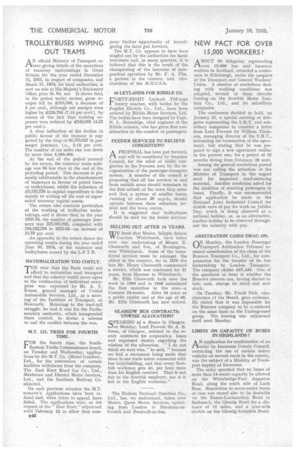TROLLEYBUSES WIPING OUT TRAMS
Page 54

If you've noticed an error in this article please click here to report it so we can fix it.
AN N official Ministry of Transport return giving details of the operations of tramway undertakingsin Great Britain for the year ended December 31, 1933, in respect of companies, and March 31, 1934, for local authorities, is now on sale at His Majesty's Stationery Office, price 2s. 6d. net. It shows that, in the period under review, gross receipts fell by £318,300, a decrease of 2 per cent., although net receipts were higher by £229,793 (7.13 per cent.), by reason of the fact that working expenses were reduced by £548,093 (4.32 per cent.).
A clear indication of the decline in public favour of the tramcar is suggested by the drop of 60,379,627 in passenger journeys, i.e., 2.13 per cent. The number of car miles run was down by more than 5,500,000.
At the end of the period covered by the return, the tramway route mileage was 94 less than at the end of the preceding period. This decrease is primarily attributable to the abandonment Of tramways in favour of petrol buses or trolleybuses, whilst the reduction of V5,133,736 in capital expenditure is due mainly to writing off the cost of superseded tramway capital assets.
The return. also contains particulars of the working of trolleybus undertakings, and it shows that, in the year 1930-34, the number of passenger journeys was 227,083,825, compared with 194,182,398 in 1932-33—an increase of 1.1.79 per cent.
An appendix to the return shows the operating results during the year ended June 30, 1934, of the tramcars and trolleybuses owned by the L.P.T.B.
NATIONALIZATION TOO COSTLY.
THEview that the State could not afford to nationalize road transport and that the cohntry would never agree to the confiscation of individual enterprise was expressed by Mr. A. T. Evans, general manager of United Automobile Services, Ltd., at a meetingof the Institute of Transport, at Newcastle. Referring to the road-rail struggle, he said it was for the Parliamentary authority, which inaugurated State control, to devise a scheme to end the conflict between the two.
M.T. CO. TRIES FOR FOURTH TIME.
FOR the fourth time, the South]. Eastern Traffic Commissioners heard, on Tuesday and Wednesday, applications by the M.T. Co. (Motor Coaches), Ltd., for the restoration of certain facilities withdrawn from the company. The East Kent Road Car Co., Ltd., Maidstone and District Motor Services, Ltd., and the Southern Railway Co. objected. '
On each previous occasion the M.T. concern's applications have been refused and, when taken to appeal, have failed. The applications were, at the request of the " East Kent," adjourned until February 12 to allow that corn pany further opportunity of investigating the facts put forward, The M.T. Co. appears to have been singled out by the authorities for harsh treatment and, in many quarters, it is believed that this is the result of the championing of the interests of independent operators by Mr. F. A. Flin, a partner in the concern and vicechairman of the M.H.C.S.A.
48 LEYLANDS FOR RIBBLE CO.
FORTY-EIGHT Leyland TS7-type luxury coaches, with bodies by the English Electric Co., Ltd., have been ordered by Ribble Motor Services, Ltd. The bodies have been designed by Capt. H. L. Betteridge, chief engineer of the Ribble concern, who has given first consideration to the comfort of passengers.
FEEDER SERVICES TO RELIEVE CONGESTION?
A PROPOSAL has been put forward,
and will be considered by Swansea Council, for the relief of traffic congestion in the Swansea area by the reerganization of the passenger-transport system. A member of the council is proposing that all bus services to and from outside areas should terminate in the first suburb of the town they enter and that a system of smaller buses, running at about 20 m.p.h., should operate between these suburban termini and the town centre.
It is suggested that trolleybuses should be used for the feeder services.
SELLING OUT AFTER 34 YEARS.
WE learn that Messrs. Salopia Saloon Coaches, Whitchurch, have taken over the undertaking of Messrs. E. Chesworth and Son, of Bronington, near Whitthurch. Some of the transferred services must be amongst the oldest in the country, for in 1879 the late Mr. Henry Chesworth commenced a service, which was continued for 21 years, from Hanmer to Whitchurch,
Mr.. Ellis Chesworth took over the work in 1900 and in 1903 introduced the first motorbus in the area—a Commer 24-seater. After 34 years as a public carrier and at the age of 66, Mr. Ellis Chesworth has now retired.
GLASGOW BUS CONTRACTS: UNWISE ALLOCATION?
SPEAKING at a dinner in Glasgow, on Monday, Lord Provost Sir A. B. Swan, of Glasgow, referred to the recent contracts for corporaticn buses and expressed doubts regarding the wisdom of the allocation. "I do not think we were wise," he said, " because we find a statement being made that there is one trade union connected with bus bodybuilding, and that every Scottish workman gets 4d. per hour more than his English confrere. That is not fair to the Scottish employer, nor is it fair to the English workman."
The Eastern National Omnibus Co., Ltd., has, we understand, taken over Messrs. Quest Motor Services, operating from London to Burnham-onCrouch and Bradwell-on-Sea.




























































































